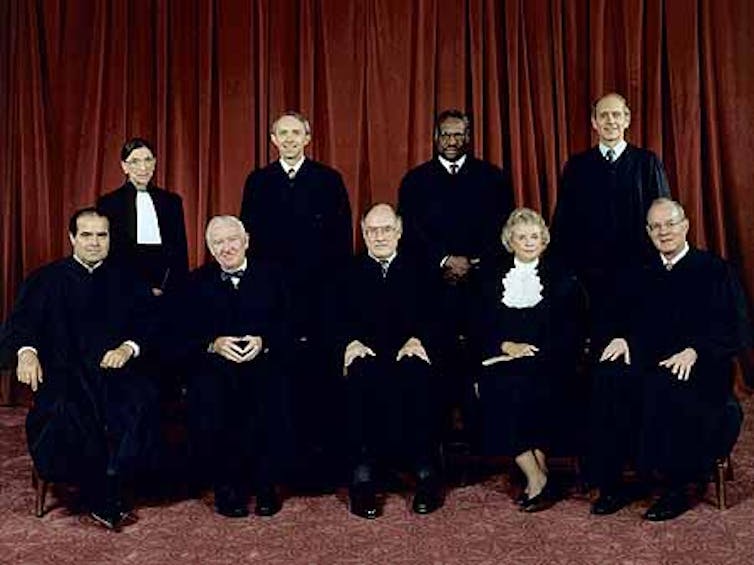As the UK marks the 50th anniversary of the 1967 Sexual Offences Act, it’s crucial not to forget that views on sexual identity and orientation are diverse and often directly contradictory – and that this applies in lawmaking, too. There’s been plenty of research on the ways public and private behaviour and sexual activity are regulated, but there’s surprisingly little analysis of the ideological and cultural forces that shape those regulations as they’re formulated.
One of the most decisive attitudes towards sexual behaviour, and especially sexual orientation, is a general fear that “challenges” to accepted norms will inevitably hasten societal disintegration regardless of whether they occur publicly or privately. And indeed, it was an argument over this idea that helped produce the Sexual Offences Act 1967.
That act only partially decriminalised male homosexuality; it didn’t legitimate sexual orientation per se, only the behaviour of two “consenting” men over 21, and crucially, “in private”. Homosexuality and homosexual behaviour were to remain covert.
This approach had been set out a decade earlier by the Departmental Committee on Homosexual Offences and Prostitution in Great Britain, led by Sir John Wolfenden, whose report concluded that it is not the duty of the law to concern itself with “immorality”. This sparked a famous legal exchange between legal philosopher H. L. A. Hart and judge Patrick (later Lord) Devlin, now known as the Hart-Devlin debate.
On the one side, Devlin argued that even private “immoral” behaviour can potentially lead to social disintegration:
When no common morality is observed … the loosening of moral bonds is often the first stage of disintegration, so that society is justified in taking the same steps to preserve its moral code as it does to preserve its government and other essential institutions.
In contrast, Hart questioned Devlin’s notion of a unified society that needed to be “protected”, one unaffected by diversity, superstition and prejudice. He also argued that societies can and do survive changes in basic moral views, and that no causal link could automatically be made between private behaviour and the state of society at large.
While the 1967 act was ultimately passed, with assorted other liberalising measures following over the next five decades, the argument over the morality of private sexual behaviour remains both public and live. And just as the Wolfenden report and the 1967 act did not end this debate in the UK, much of the world is still arguing over whether and why private sexual behaviour demands regulation.
Caught out
Take, for example, the US, which has been on quite a legal journey when it comes to sodomy in particular.
In 1986, the US Supreme Court heard the case Bowers v. Hardwick, brought by a Georgia resident named Michael Hardwick, who claimed that a state law criminalising sodomy was unconstitutional. The court ultimately ruled against him. The justices’ majority opinion cited the 18th-century English jurist William Blackstone, who argued that homosexual sex is “an infamous crime against nature”, and argued that “millennia of moral teaching would be overturned to accept such practices”.
Such notions of “moral teaching” are often based upon a selective religious interpretation of “natural law”, under which sex is proscribed unless it takes place between men and women, in a particular manner, and for the purposes of procreation. Whether the sex happens in private, it seems, was considered irrelevant. On the other hand, a dissenting argument by Justice Harry Blackmun focused on the right to privacy that Hardwick had claimed, which Blackmun said was enshrined in “broad principles” that the court had failed to properly consider.

The case wasn’t overruled until another Supreme Court case in 2003, Lawrence v. Texas, which many still see as a landmark decision. It began when police officers in Houston, Texas were called to a supposed weapons disturbance and entered a home to instead find two men, John Geddes Lawrence and Tyron Garner, having sex. (The neighbour who called the police was convicted of filing a false report.)
In contrast to Bowers v. Hardwick, the court struck down the sodomy law in Texas in a 6-3 decision, stating that intimate consensual sexual conduct was part of the liberty protected by substantive due process under the 14th Amendment, regardless of the sex of the participants. According to the majority opinion, the case involved “two adults who, with full and mutual consent from each other, engaged in sexual practices common to a homosexual lifestyle” and “the state cannot demean their existence or control their destiny by making their private sexual conduct a crime”.
Yet even in an era where the Supreme Court has ruled in favour of same-sex marriage, the argument is still not entirely resolved: lawsuits over certain US states’ anti-sodomy laws continue to this day.
The debate continues
The European Court of Human Rights has also been challenged to decide whether to legitimise or challenge the idea that private behaviour matters to society at large. This lately presented itself in the November 2016 case Kaos GL v. Turkey, which centred upon the seizure and confiscation of all the copies of issue 28 of a magazine published by Kaos GL, a Turkish cultural research and solidarity association for lesbian, gay, bisexual and transgender people.
The case reveals how the court attempts to accommodate diverse attitudes. The court ultimately decided that the confiscation was a “disproportionate interference” with Kaos GL’s right to freedom of expression – and that the Turkish authorities’ defence of attempting to “protect public morals” didn’t excuse the overstep. It concluded that simply prohibiting the magazine’s sale to minors or requiring content warnings would have sufficed.
This amounts to a refusal to defer to powerful cultural norms. Recent reports from Turkey illustrate that while homosexuality is more and more publicly visible, it still doesn’t enjoy much in the way of understanding, acceptance, or tolerance. Many homosexual men are stereotyped as feminised, unfit for military service, and curuk raporu (rotten). In 2015, Efkan Ata, a former minister of internal affairs, said he opposed gay marriage as “the destruction of humanity”.
These are problems all over the world. Many people still believe that homosexuality and “non-conventional” pornography, will inevitably corrupt public morals, weaken or change society, even cause societal collapse, even if they exist or take place out of public view. As the UK celebrates 50 years since the great change of 1967, the Hart-Devlin debate is as relevant as ever.

